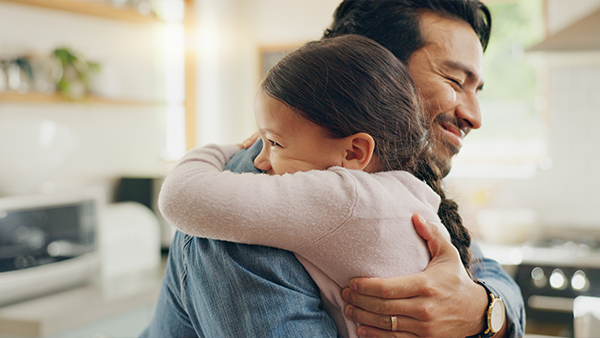Fathers, present or absent, impact their children. The positive and/or negative effects of parent-child relationships generally last a lifetime.
As a father, one of the most important lessons I’ve learned is that our children need us to be present in their lives—emotionally, mentally, and physically. That presence, in its many forms, is the foundation of a healthy relationship between you and your kids.
Being present goes beyond just showing up. It’s about creating a space where your children feel safe, loved, and understood.
Fatherhood isn’t about being perfect. It’s about being “good enough” and loving your child through every challenge. It’s about making sure your child knows you’ll always have their back, no matter what.
That’s the essence of being a dad—and it’s also the best way to support the mental health of your kids. With a recent study revealing that the risks of depression and anxiety are significantly higher among young men than among the broader male population, this kind of fatherly care is more important than ever.
A heartbreaking lesson
Thirty years ago, while working as a palliative care doctor at St. Paul’s Hospital in Vancouver, I witnessed a heartbreaking pattern that would forever shape my understanding of fatherhood. As I cared for patients battling HIV and AIDS, mothers would travel from across the country to be with their sons as they neared the end of their lives. Yet, time and again, fathers were notably absent.
One evening, I overheard a young man reach out to his father for what would be the last time. “Dad,” he said over the phone, “I have three things to tell you. First, I’m gay. Second, I have AIDS. And third, I’m dying.” A heavy silence followed each statement. After a brief goodbye, he hung up the phone and walked back to his room.
In the days following, I found myself asking two questions: Would my own father be there for me? And if this were my child, would I be there for them?
That experience was central to shaping my work with fathers and men. It led to my co-founding of Blueprint, a non-profit working to improve men’s well-being and enhance their positive contributions to communities.
As a father, one of the most important lessons I’ve learned is that our children need us to be fully present in their lives—not just physically, but also emotionally and mentally. In its many forms, this presence is the foundation of a healthy relationship between you and your kids.
This understanding has only deepened in recent years. As a researcher, I’ve spoken with individuals aged 21 to 93, each reflecting on positive relationships with their fathers. Over and over, the theme that emerged from these conversations was the profound impact of the father’s presence.

What does ‘being present’ really mean?
Being present is more than just being in the same room as your child. It’s about creating a space where children feel safe, cherished, and genuinely understood. Your child needs to know that you are fully there for them.
One of the most profound examples I’ve come across was a firefighter who explained the difference between two kinds of fathers. He said that if his daughter were in a car accident, she could react in one of two ways. She could either say, “Don’t call my dad; he’ll kill me,” or she could say, “Call my dad; he’ll know exactly what to do.” That second response speaks to the kind of father every child deserves—a father who offers support regardless of the situation and asks, “Are you okay? How can I help?”
Being present also means being willing to see the world through your child’s eyes. I have two daughters who are passionate about dance and musical theatre, neither of which I knew much about before they were born. I quickly realized that being a present father wasn’t about pulling them into my world; it was about engaging with theirs. I learned how to braid hair, critique choreography, and appreciate musicals.
My car wasn’t filled with soccer balls or baseball bats but with hairbrushes and dance costumes. I immersed myself in their passions and met my children where they were, not where I wanted them to be.
Help your kids improve their self-worth
As fathers, we have a tremendous influence on our children’s emotional development. One of the most important things we can do is affirm their emotions. If your child is sad, angry, or scared, acknowledging those feelings helps them develop a healthy sense of self-worth. By validating their emotions, we show them that it’s okay to feel—and that feelings don’t make them weak.
Unfortunately, many men have been raised in environments where showing emotion was discouraged. Old-school phrases like “suck it up” and “be a man, don’t cry” teach children to suppress their emotions. As a result, many men have grown up disconnected from their feelings, and we now know that men who suppress their emotions are more likely to experience depression and shame.
While working with firefighters and police officers, I often encounter men who say, “I don’t feel anything.” What they’re really expressing is a lifetime of emotional suppression. That’s why it’s essential to teach our children, especially our sons, that emotions are natural and necessary and that they can safely express them without fear of judgment.
Break the cycle
For many men, their relationship with their father serves as the blueprint for how they parent. If you have a distant or emotionally absent father, it’s easy to default to that same behaviour with some confusion about what it means to be a good father.
The best way to break that cycle is to take an honest look at the relationship with your dad. Ask yourself: How did he treat me? Was he present in my life? Did he show kindness and affection? How did he affect my childhood and adolescence? Are those features with me as an adult? By reflecting on these questions, you can begin to understand the impact your father had on you and make conscious decisions about what kind of parent you want to be.
For me, this reflection happened when my eldest daughter was around eight years old. I realized that I had been emotionally absent, not because of mental illness like my own father’s, but because I was giving all my care and attention to my patients.
That’s when I made the decision to change. I wanted my daughters to know what it felt like to be truly loved by their father. I wanted to be present in their lives. I committed to doing whatever it took to show them that—to be available to help them with their homework, cheer them on at a dance competition, stand in the rain watching a soccer game, and accompany them on the piano in a talent show.

How to get your kids to open up
It can be very frustrating when your child refuses to open up. You might be the most understanding father on earth, but sometimes, kids simply don’t want to share their thoughts or feelings.
Teenagers can be particularly withdrawn, with peer pressure and anxiety often surging during those years. That’s why it’s essential to be patient and understanding during these turbulent times.
Getting your kids to open up may involve creating an environment where they feel safe and free from judgment. When your child shares something that’s on their mind, is your first thought to respond with whether it is right, wrong, or what you would do instead?
Children are often more willing to share their thoughts and feelings when they feel accepted and not evaluated. Leaving space for them to share their thoughts with you and taking a moment to acknowledge their perspective, even if you don’t fully agree with what they are sharing, shows them that their voice matters and strengthens the bond between you.
One particular strategy I’ve found helpful is spending time with your children in a setting where conversation happens naturally, like a road trip. There’s something about being in the car, with the music they like playing in the background, that makes them more likely to talk. It is important not to force these moments but to be there consistently so that you’re ready when they want to talk.
Launching into conversations about feelings can be challenging for children, but gentle, open-ended questions can create a safe space for kids to share their struggles. Open-ended questions allow your child to respond in their own way without feeling pressured. They show that you’re genuinely interested in their well-being and are ready to listen rather than rushing to offer advice or solutions.
It is particularly important to begin conversations with your children when you notice changes in behaviour, mood and/or relationships. It is vital that your child knows they can come to you in times of trouble. That’s why it’s a good idea to end questions with this phrase: “I’m here for you if and when you’re ready to talk about it.”
In our family, we had a rule: if our kids were ever in a situation where they needed help, they could call us, and we would only ask where they were and if they were safe. This built trust because they knew they could rely on us without fear of punishment or judgment.
How fathers can support their LGBTQ+ children
Supporting an LGBTQ+ child means embracing them with love, understanding, and a genuine commitment to being their ally. These children often face unique challenges, like societal stigma, fear of rejection, and a sense of being different from their peers, all of which can contribute to feelings of isolation and/or struggles with mental health.
Recent research from the Canadian Men’s Health Foundation shows that the risks of depression and anxiety are significantly higher in gay or bisexual men compared to the broader male population.
This makes a father’s support all the more crucial to the well-being of LGBTQ+ children. As a father, your role is to provide a safe and accepting space where your child feels valued, loved and that they belong.
Start by using affirming language, such as “I support you no matter what,” to reassure them that your love is unconditional. Educate yourself about LGBTQ+ issues to better understand what they might be experiencing. Speak to other parents who have had a similar experience. This effort shows you’re committed to being an informed ally, ready to stand by them through any challenges.
Incorporating your child’s preferred name and pronouns is another crucial step. It validates their identity and fosters a more profound sense of belonging. Remain open to conversations about their identity, letting them share when ready, and advocate for them within the family and beyond.

How fathers can support their children in crisis
A father’s support becomes vital when a child faces a crisis, whether due to emotional struggles or external challenges.
Begin by being present—both emotionally and physically—so your child knows they are not alone and can turn to you without fear of judgment.
Listen carefully to their concerns, and watch for signs that their struggles go beyond everyday stress. Changes in behaviour, such as extreme withdrawal, mood swings, or disturbances in sleep and appetite, can indicate deeper issues that may require professional help.
It’s crucial to be proactive without pushing too hard. Let your child know you are there to support them, but also respect their feelings and readiness to talk. Offer reassurances like “I’m here for you” and “We’ll face this together” to show they’re not alone.
When the situation calls for it, gently suggest seeking professional help. Finding a counsellor or support group can be an essential step in addressing deeper issues. Offer to accompany your child to appointments, showing that you’re committed to being part of the solution. This shared approach can help ease their anxiety and remind them they don’t have to go through it alone.
By balancing action with compassion, fathers can guide their children through crises with steady and loving support, ensuring they get the help they need.
The most important gift a father can give is unconditional love
Your child needs to know that you will always be there for them no matter what they do or who they are. I’ve told my kids repeatedly: “I love you. I’m proud of you. And I wouldn’t have wanted to live my life without you in it.” Those words matter and give children a sense of security and belonging that they carry with them throughout their lives.
What was your relationship with your father like? Please join this important conversation in the comments below.
Are You at Risk?
Learn your risk level for the most common men’s health conditions in 10 minutes with a free, confidential, and personalized report.





I enjoyed this article. So refreshing to be shown such a simple yet profound way to relate to your children, thereby giving them the confidence and assurance to be open, honest and to feel valued. So simple…so profound.